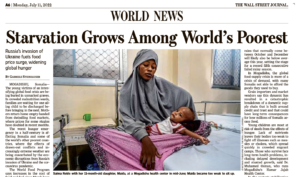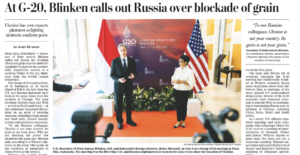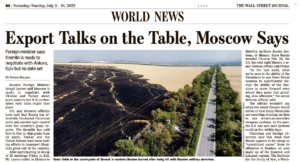Tariffs imposed by the Trump administration collected an estimated $958 million in revenue from selected agricultural inputs from February to October of 2025, according to North Dakota State University's monthly…
Russia’s War Contributes to Worst Hunger Emergency Since 1960s, While Moscow Says Ukraine Grain Export Talks on the Table
Gabriele Steinhauser reported in today’s Wall Street Journal that, “The worst hunger emergency in a half-century is afflicting Somalia and some of the world’s other poorest countries, where the effects of drawn-out conflicts and increasingly extreme weather are being exacerbated by the economic disruptions from Russia’s invasion of Ukraine and the coronavirus pandemic.
The World Food Program says that increases in the cost of food and fuel since March have pushed an additional 47 million people into acute food insecurity, when a person is no longer able to consume enough calories to sustain her life and livelihood, taking the total to 345 million people world-wide. Of those, some 50 million are living on the edge of famine.
“In Somalia, Ethiopia, South Sudan, Yemen and Afghanistan, nearly 900,000 people already face starvation and death. That is a more than 10-fold increase from 2019—and, by some estimates, could result in more people dying from hunger in 2022 and 2023 than in any years since the 1960s and China’s disastrous Great Leap Forward agricultural policies.”

Today’s article stated that, “Although global market prices for some foods, most notably grain, have dropped in recent weeks, people who study supply chains warn that it could take months for those decreases to filter down to hard-to-access countries, too late for thousands of families who are starving now. High fuel prices, meanwhile, continue to inflate the cost of everything from shipping food aid to trucking drinking water and, along with difficulties obtaining credit, are pushing local traders into bankruptcy.”
And writing in Saturday’s Wall Street Journal, Sara Ruberg and Alistair MacDonald reported that, “Rampant food inflation is roiling the world’s least-developed nations. It is also hitting poor people in rich countries.
“Matsentralen Norge, a food-bank operator in oil-rich Norway, says it is distributing 30% more food compared with the same period in 2021, a year that in itself saw sharply higher demand because of the Covid-19 pandemic. Food-bank usage is on the rise in the U.S., too, while grocery stores report customers there are trading down, buying more store-brand food and avoiding more expensive meat and fish.”
In more specific news regarding Ukraine’s grain exports, Maham Javaid and Safak Timur reported in Friday’s New York Times that, “The Ukrainian Foreign Ministry sharply criticized Turkey on Thursday, saying Ankara had allowed a Russian ship to leave a Turkish port despite Kyiv’s claims that it was carrying grain stolen from Ukraine.”
Friday’s article noted that, “In mid-May, the United States warned that Russian cargo vessels were leaving ports near Ukraine laden with what it described as ‘stolen Ukrainian grain,’ and said that Russia might try to sell plundered wheat to African countries facing possible food shortages.”
Also, John Hudson reported in Saturday’s Washington Post that, “Secretary of State Antony Blinken called out Russia for blocking Ukrainian grain exports amid rising global food prices in a contentious closed-door session at a meeting Friday of the top diplomats from the world’s largest economies.”

“[Indonesia’s foreign minister, Retno Marsudi] emphasized that soaring fuel and grain prices were disproportionately affecting poor and developing countries and that the absence of a response from the G-20 would undermine the credibility of the multilateral system put in place after World War II,” the Post article said.
Nonetheless, Vivian Salama reported in Saturday’s Wall Street Journal that, “Russian Foreign Minister Sergei Lavrov said Friday that Moscow is ready to negotiate with Ukraine and Turkey about grain exports but it is unclear when such talks might take place.
“Western leaders, meanwhile, sought to pressure Mr. Lavrov at the Group of 20 ministerial summit in Bali, Indonesia, accusing Moscow of preventing Ukrainian grain from reaching global markets. Mr. Lavrov walked out of two meetings at the summit and accused Western countries of ‘frenzied Russophobia.'”
Salama pointed out that, “Ukrainian Foreign Minister Dmytro Kuleba, in a speech to the summit, said the Russian naval blockade has ‘shredded global chains of food supply‘ to the detriment of global food security. He detailed how Russia has stolen Ukrainian grain and bombs Ukrainian granaries. Russia has denied stealing Ukrainian grain.”

Meanwhile, Bloomberg reported on Saturday that, “Rice production is under threat in parts of Asia from higher fertilizer costs at a time when demand is increasing, posing a potential risk to food security and efforts to contain inflation.
“Crop yields may decline in Thailand, the world’s second-largest exporter, because of elevated prices for crop nutrients, according to a research unit of Kasikornbank Pcl, while in the Philippines, the No. 2 importing country, a lower harvest is likely to increase the need for overseas purchases. China’s worried about the crop impact of pests, while India’s output depends on a good monsoon.
“Most of the world’s rice is grown and eaten in Asia, making it vital for political and economic stability in the region. In contrast to the surge in wheat and corn prices after Russia’s invasion of Ukraine, rice has been subdued, but there is no guarantee it will remain so. Back in 2008, prices soared above $1,000 a ton, more than double the level now, amid a panic over supplies.”
And late last week, Reuters writers Gus Trompiz and Michael Hogan reported that, “European Union wheat is being scooped up at the start of the 2022/23 crop season as importers profit from a pullback in prices from records and seek alternatives to Ukrainian supplies disrupted by war, traders and analysts said.
“A rare purchase of German wheat this week by Egypt’s state grains buyer, which ramped up direct purchases outside international tenders, underscored how EU wheat is being tapped in the Middle East and Africa to cover the early part of the new season that started this month.”





